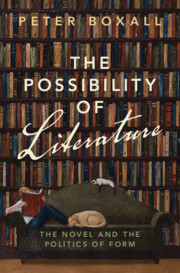Book contents
- The Possibility of Literature
- The Possibility of Literature
- Copyright page
- Dedication
- Epigraph
- Contents
- Figures
- Acknowledgements
- Introduction
- Part I On Writers
- Chapter 1 A Sort of Crutch
- Chapter 2 Samuel Beckett
- Chapter 3 A Leap Out of Our Biology
- Chapter 4 A More Sophisticated Imitation
- Chapter 5 A Cleaving in the Mind
- Chapter 6 Zadie Smith, E. M. Forster and the Idea of Beauty
- Part II On Literary History
- Part III On the Contemporary
- Notes
- Bibliography
- Index
Chapter 1 - A Sort of Crutch
Race and Prosthesis in Herman Melville’s Fiction
from Part I - On Writers
Published online by Cambridge University Press: 10 October 2024
- The Possibility of Literature
- The Possibility of Literature
- Copyright page
- Dedication
- Epigraph
- Contents
- Figures
- Acknowledgements
- Introduction
- Part I On Writers
- Chapter 1 A Sort of Crutch
- Chapter 2 Samuel Beckett
- Chapter 3 A Leap Out of Our Biology
- Chapter 4 A More Sophisticated Imitation
- Chapter 5 A Cleaving in the Mind
- Chapter 6 Zadie Smith, E. M. Forster and the Idea of Beauty
- Part II On Literary History
- Part III On the Contemporary
- Notes
- Bibliography
- Index
Summary
In the whalebone leg worn by Captain Ahab in Moby Dick, Melville invents one of the most famous prostheses in the history of the novel. What imaginative labour, that novel asks, is required to force inanimate matter to take on the attributes of life? How do we convert the heavy stuff of which we are made – of which a hostile and inhuman world is made – into the living expression of mind?
This essay explores Melville’s response to this question, particularly as it unfolds in his novella Benito Cereno. The prosthetic logic that is at work in Moby Dick reaches a certain intensity in this short work – where it becomes entangled with the question of racial difference, the question that is at the heart too of the discussion, in Moby Dick, of the ‘whiteness of the whale’. In Benito Cereno, the relation between the white master Cereno and the black manservant Babo is conceived as a prosthetic one. Babo is described as acting as ‘a sort of crutch’ to Cereno, a black extension of white power. The narrator’s capacity to read the power dynamic between Cereno and Babo, between master and servant, depends on the terms in which he conceives of this crutch. If Melville’s novella might be read as a critique and a performance of the process by which a form of black power expresses itself, outside of the terms of what Toni Morrison calls the ‘ideology of whiteness’, then that reading requires us to understand how the capacity for revolutionary self-expression is woven, in Melville’s fiction, into the prosthetic extensions in which it materialises itself.
- Type
- Chapter
- Information
- The Possibility of LiteratureThe Novel and the Politics of Form, pp. 29 - 46Publisher: Cambridge University PressPrint publication year: 2024

